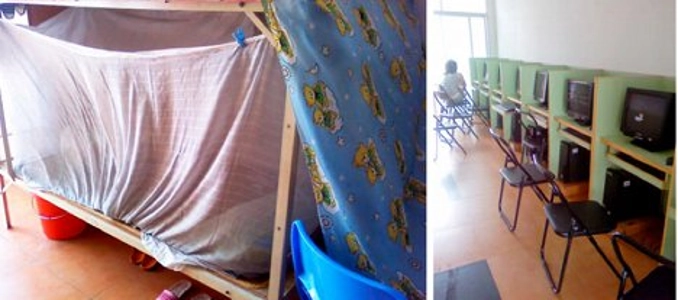
© SACOM
Electronics Production |
'Excessive working hours decreased', states report
In 2008, the makeITfair project researched working conditions at 4 factories operating in the Guangdong province in China, namely Celestica Technology, Flextronics International (incl. Vista Point Technologies/Multek), and Hong Fu Jin Precision of Foxconn.
They manufacture or deliver components to portable music player, multimedia phone and video game console companies, namely Apple, Microsoft, Motorola, Philips and Sony. This follow-up report re-examines working conditions at these 4 factories two years after the first research. Although improvements are visible, work is still to be done.
• Student Interims:
In 2008, all 4 factories employed student interns (16-18 years old). Contracts ranged from a few months to 1 year. Although the report suggests that the number of student workers has dropped, results for the various facilities differed greatly.
• Labour Agencies monitored.
"It seems that two out of four factories (Celestica and Foxconn) have stopped using labour agencies – or at least paid salaries directly to contract workers without intermediate agencies in between. The other two factories (both belonging to Flextronics) have started to monitor the fees collected by the agencies more carefully by, for example, conducting regular discussions with workers to verify the collected amounts. One factory has even set a lower maximum for agency fees than the Chinese regulations. These actions show that there have been problems related to unauthorised agency fees as reported by makeITfair", the report states.
• Wages increased, but still not sufficient.
All four factories have increased their basic wages for entry-level workers by around 20–40% from the levels of 2008, paying between CNY 1'080–1'243 (EUR 124–142) per month, which is 9-17% above the legal minimum wage for full-time work. Foxconn has raised basic wages in Shenzhen (Evertiq reported) and is now the highest paying out of the 4 monitored factories.
• Excessive working hours decreased a little.
In China workers often take on extra hours to try to raise their wages. In three factories, workers were employed for 60–100 hours overtime per month during the peak season. In one factory (Celestica), up to over 120 hours overtime was worked; a gross violation of Chinese labour law that limits overtime to 36 hours per month. As an aftermath of the suicide tragedies, Foxconn has reduced overtime significantly and guaranteed workers one day-off every week since mid-2010. It is the only company which sets a clear goal of meeting the target of legal overtime of 36 hours within 2011.
• Less strict discipline, unpaid work meetings.
Wage (or bonus) deductions, due to punitive fines were evident in 3 out of 4 factories researched in China in 2008. It seems that the factories have subsequently abolished the monetary fines, although there remained many factory regulations and disciplinary practices in place. Workers at two factories (Multek and Foxconn) felt less stressed and considered discipline less strict than before.
